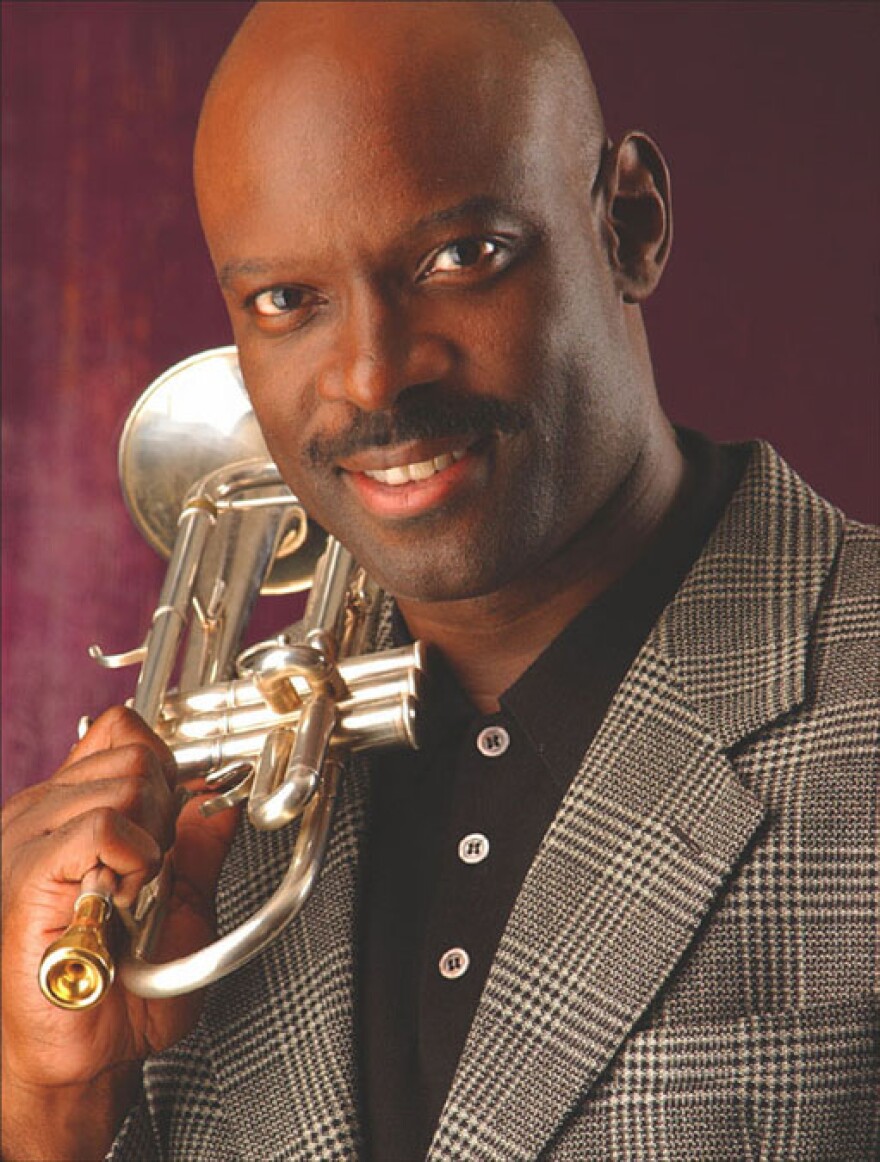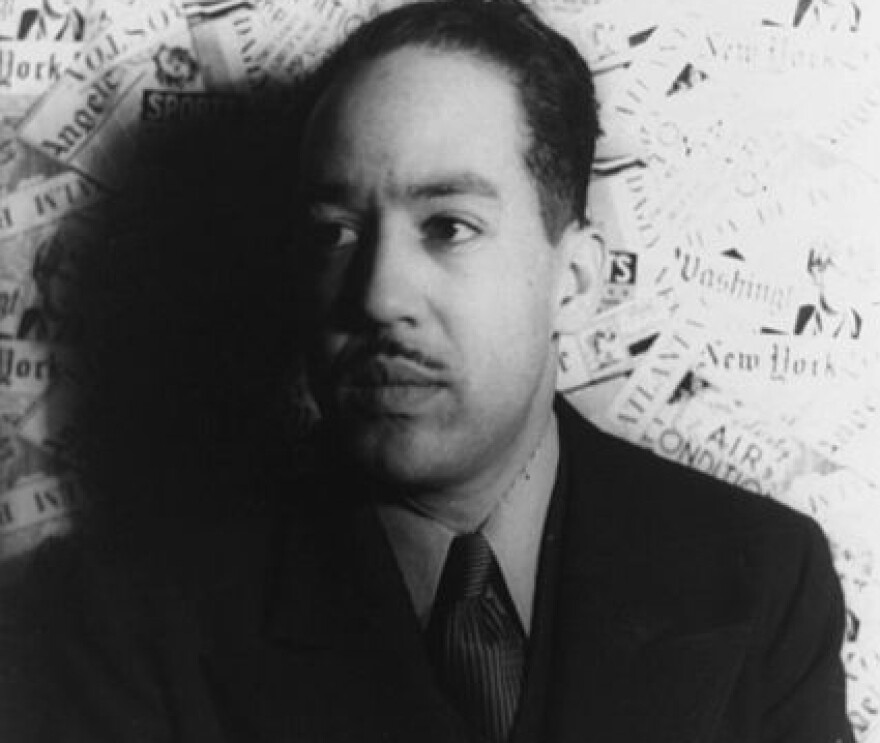As narrator, bandleader, trumpeter and composer, is the central dynamic force powering his acclaimed, multimedia presentation of a Langston Hughes trailblazing magnum opus, Ask Your Mama: 12 Moods for Jazz.
Perhaps not as widely known as such renowned poems as "Dream Deferred" or "The Negro Speaks of Rivers" ŌĆö verbal licks deeply embedded in AmericaŌĆÖs poetic consciousness ŌĆö Ask Your Mama is nonetheless an edgy, emotional, experimental masterwork crying out in the early 1960s for social justice, freedom, and artistic liberty for blacks both at home and abroad.
Hughes began writing the piece, which he dedicated to Louis Armstrong, while serving as poet-in-residence at the 1960 Newport Jazz Festival. Plans for a musical collaboration with Charles Mingus and later with Randy Weston fell through. The work, which was published in 1961, was never performed with jazz accompaniment before Hughes's death from prostate cancer in 1967 at the age of 65.
McCurdy, a professor of music at the University of Southern California, has over the past decade presented his ambitious Hughes homage ŌĆö he calls it his ŌĆö many hundreds of times in museums, colleges, halls, and auditoriums throughout the United States. He was assisted in his demanding stint as narrator/host (reciting Hughes's 12-part, pyrotechnical verbal suite) by the famous rapper/actor Ice T, who played the role (the symbolic stand-in for Hughes himself) at the projectŌĆÖs European debut at LondonŌĆÖs Barbican Centre.
McCurdy, a Ph.D. who enjoys success in both the academic and performance worlds, is, thanks to a call from Yale Professor Willie Ruff, bringing his acclaimed media mix of Hughes and the blues to the East Coast. He on Friday, October 28, at 7:30 pm at the Morse Recital Hall in Sprague Hall at Yale School of MusicŌĆÖs prestigious Ellington Jazz Series, founded by Ruff in 1972.
McCurdy, who doubles as the narrator and as the trumpeter in his backup jazz quartet, shares the narrating role for the Yale appearance with spoken-word artist Kenyon Adams, and is joined by musical collaborators, pianist Yuma Sung, bassist Noah Jackson and drummer Bryan Carter.
When not at the podium/pulpit moving the congregation with Hughes's searing social commentary and rousing satirical sermonette, McCurdy is off in the shadows at stage left, playing inspiring trumpet solos.
At the same time, heŌĆÖs making sure that an unfolding montage of historic images on a giant screen on center stage is synchronized with the thematic material and narratives of the poem whose sections, or moods, range from such music-steeped titles as "Blues in Stereo" to "Bird in Orbit."
Ask Your Mama, the poetic suiteŌĆÖs title mood, is inspired by the classic tradition of quick-witted insult contests and trash talk showdowns, a black folkloric element that Hughes uses in ironic refrains and witty put-downs of white supremacists.
What McCurdy, a mixed media alchemist, has done is blend Hughes's blues-drenched poetic hues and cries against racism and caustic calls for justice with a flowing, complementary, thought-provoking mix of spoken word, original jazz pieces and compelling images appearing sequentially on screen, including some surprising, archival treasures, replete with allusions to the Harlem Renaissance.
As the verse is recited at the podium by McCurdy, delivered with the dramatic flair of a charismatic preacher at the pulpit, you hear swinging, original music performed by his quartet ŌĆö pieces echoing the vibrant sense of syncopation, freedom, and groove that crackles through the jazz and blues-loving Hughes's poetic, riffing lines.
Co-composed by McCurdy and his colleague and former student, Eli Brueggemann, the music director for "Saturday Night Live," the suiteŌĆÖs musical moods are inspired by Hughes's annotations in the text's margins providing cues for what musical styles he wanted to accompany his words. In a phone interview, McCurdy said the quartetŌĆÖs continuous original jazz accompaniment functions like a supportive soundtrack for a film, while the parade of historic images marching across the screen on stage is designed to give the audience visual anchors along the epic poemŌĆÖs freewheeling, visionary journey.
DonŌĆÖt be turned off by the undeniable density of the poemŌĆÖs challenging language or by its flood of references to early ŌĆś60s figures because, as McCurdy noted, the live performance is as much about enjoyment as it is about enlightenment and learning. In many pleasant ways, he added, the multimedia show is charged with the emotion of an inspiring revival meeting far removed from any arid, purely academic exercise in resurrecting an American classic.
To break the ice and establish a comfort zone, McCurdy, in his engaging preacher mode, exhorts his audience/congregation in his opening remarks. ŌĆ£Treat this performance as you would a good ole Southern Baptist Church service," he said. "If you hear something you like, itŌĆÖs okay to shout out, ŌĆśAmen!ŌĆÖŌĆØ
Audience members regularly respond with an ŌĆśAmen!ŌĆÖ to Hughes's on-target barbs against bigotry and to the warm, right-on, down-home reflections by this great bard of black life. With enthusiasm, they clap hands in rhythm to the quartetŌĆÖs spirited, soulful music, at times even seeming to be on the verge of springing out of their seats and parading around the hall New Orleans style.

While the work is deeply serious about profound issues, itŌĆÖs also funny, entertaining, and often inspires the spontaneous creation of a responsive amen corner in whatever hall it plays.
ŌĆ£Oh, itŌĆÖs very hilarious at times,ŌĆØ McCurdy said of its dramatic, tragic/comic mix. ŌĆ£Sometimes people just cackle and laugh out loud, especially those who know the history and recognize the names of the targeted staunch segregationists.ŌĆØ
Hughes, a giant figure in the Harlem Renaissance, lays down the verbal riffs in his 12-part suite (a reference echoing the classic 12-bar blues form) that sear like an earthy Charlie Parker blues chorus or soar as freely as an Ornette Coleman flight over the skies of America.
Or, in his role as an improvising, street-smart sage, poet/philosopher and verbal trickster/magician, Hughes just might toss down skeins of brilliant metaphors and images in the drip and spatter action painting method of Jackson Pollock. His mix of Swiftian satire and Redd Foxx bite lives and breathes in a surreal world of whirling words and tricky tropes in which Niagara Falls is frozen over and Martin Luther King Jr. is not only the governor of Georgia but also a mythic hero galloping on a unicorn with ŌĆ£blood and moonlight on its horn.ŌĆØ
Although seemingly disparate elements ŌĆö poetry, jazz, and a montage of historic images ŌĆö McCurdy weaves them all into a unified work.
"Most importantly," he suggested, ŌĆ£the multimedia work helps us understand how we deal with AmericaŌĆÖs original sin, that being slavery.ŌĆØ
ŌĆ£How do we approach that? How do we have an intelligent conversation without there being the kind of vitriol that we tend to see at times?ŌĆØ he asked.
ŌĆ£Even more than 50 years later, the issues of freedom and justice raised by Langston Hughes are still relevant today. If he were alive today, I believe heŌĆÖd be a hip-hop artist. And thatŌĆÖs what I love about the work, its history and its continuing relevance.ŌĆØ Tickets start at $20.00; students, $10.00. Call (203) 432-4158.
Please submit press releases at least three weeks before publication date to omac28@gmail.com. Comments welcome.





